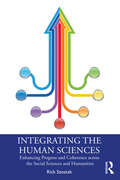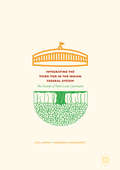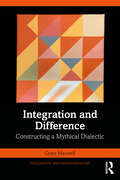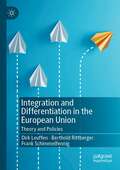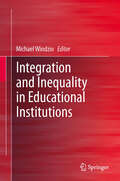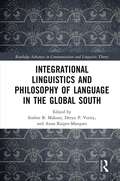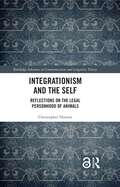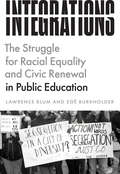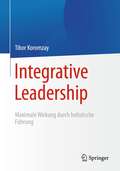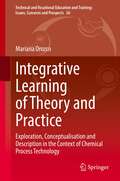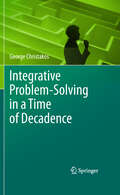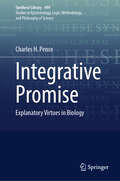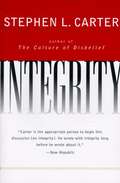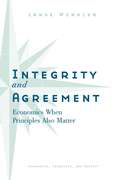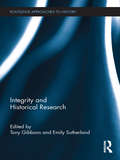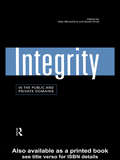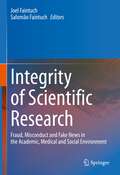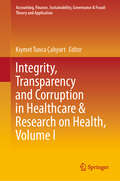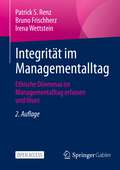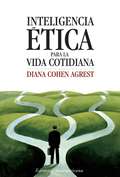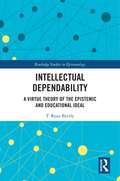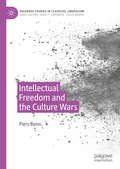- Table View
- List View
Integrating the Human Sciences: Enhancing Progress and Coherence across the Social Sciences and Humanities
by Rick SzostakWhat if we recognized that the human sciences collectively investigate a few dozen key phenomena that interact with each other? Can we imagine a human science that would seek to stitch its understandings of this system of phenomena into a coherent whole? If so, what would that look like? This book argues that we are unlikely to develop one unified "theory of everything." Our collective understanding must then be a "map" of the myriad relationships within this large – but finite and manageable – system, coupled with detailed understandings of each causal link and of important subsystems. The book outlines such a map and shows that the pursuit of coherence – and a more successful human science enterprise – requires integration, recognizing the strengths and weaknesses of different methods and theory types, and the pursuit of terminological and presentational clarity. It explores how these inter-connected goals can be achieved in research, teaching, library classification, public policy, and university administration. These suggestions are congruent with, and yet enhance, other projects for reform of the human sciences. This volume is aimed at any scholar or student who seeks to comprehend how what they study fits within a broader understanding.
Integrating the Third Tier in the Indian Federal System
by Atul Sarma Debabani ChakravartyThis book discusses the evolution of the third tier of the Indian federal system, with a focus on rural local governance (commonly known as Panchayati Raj) against the backdrop of important theoretical and empirical literature on the relevance and effectiveness of service delivery in the decentralized system. It evaluates the quintessence of the functioning of the Panchayati Raj in the past two decades of its existence. This pioneering book also discusses the treatment of the third-tier government in the inter-governmental fiscal transfer framework and the delineation of the unique institution of local self-government in the Northeastern Indian States. In the light of the loosely evolved fiscal relations between three levels of government, it has been observed that local self-governments in the bottom tier have not been truly empowered yet. The book argues in favor of integrating the third-tier government into the Indian federal system and suggests how this could be achieved.
Integration and Difference: Constructing a Mythical Dialectic (Philosophy and Psychoanalysis)
by Grant MaxwellThis groundbreaking work synthesizes concepts from thirteen crucial philosophers and psychologists, relating how the ancient problem of opposites has been opening to an integration which not only conserves differentiation but enacts it, especially through the integration of myth into the dialectic. Weaving a fascinating narrative that ‘thinks with’ the complex encounters of theorists from Baruch Spinoza, G. W. F. Hegel, Friedrich Nietzsche, and William James to Alfred North Whitehead, C. G. Jung, Gilles Deleuze, and Isabelle Stengers, this book uniquely performs the convergence of continental philosophy, pragmatism, depth psychology, and constructivist ‘postmodern’ theory as a complement to the trajectory culminating in Jacques Derrida’s deconstruction. This is an important book for professionals and academics working across the humanities and social sciences, particularly for continental theorists and depth psychologists interested in the construction of a novel epoch after the modern.
Integration and Differentiation in the European Union: Theory and Policies
by Frank Schimmelfennig Dirk Leuffen Berthold RittbergerFar from displaying a uniform pattern, European integration varies significantly across policy areas and individual countries. Why do some member states choose to opt out of specific EU policies? Why are some policies deeply integrated whereas others remain intergovernmental? In this updated second edition, the authors introduce the most important theoretical approaches to European integration and apply these to the trajectories of key EU policy areas. Arguing that no single theory offers a completely convincing explanation of integration and differentiation in the EU, this thought-provoking book provides a new synthesis of integration theory and an original way of thinking about what the EU is and how it works.
Integration and Inequality in Educational Institutions
by Michael WindzioThis volume addresses questions that lie at the core of research into education. It examines the way in which the institutional embeddedness and the social and ethnic composition of students affect educational performance, skill formation, and behavioral outcomes. It discusses the manner in which educational institutions accomplish social integration. It poses the question of whether they can reduce social inequality, - or whether they even facilitate the transformation of heterogeneity into social inequality. Divided into five parts, the volume offers new insights into the many factors, processes and policies that affect performance levels and social inequality in educational institutions. It presents current empirical work on social processes in educational institutions and their outcomes. While its main focus is on the primary and secondary level of education and on occupational training, the book also presents analyses of institutional effects on transitions from vocational training into tertiary educational institutions in an interdisciplinary and internationally comparative approach.
Integrational Linguistics and Philosophy of Language in the Global South (Routledge Advances in Communication and Linguistic Theory)
by Sinfree B. MakoniExploring the nature of possible relationships between Integrational Linguistics and Southern Epistemologies, this volume examines various ways in which Integrational Linguistics can be used to support the decolonizing interests of Southern Epistemologies, particularly the lay-oriented nature of Integrational Linguistics that Southern Epistemologies find productive as a ‘positive counter-discourse.’ As both an anti-elitist and antiestablishment way of thinking, these chapters consider how Integrational Linguistics can be consistent with the decolonial aspirations of Southern Epistemologies. They argue that the relationship between Southern Epistemologies and Integrational Linguistics is complicated by the fact that, while Integrational Linguistics is critical of what it calls a segregationist view of language, i.e., ‘the language myth,’ Southern Epistemologies in language policy and planning and minority language movements find the language myth helpful in order to facilitate social transformation. And yet, both Integrational Linguistics and Southern Epistemologies are critical of approaches to multilingualism that are founded on notions of ‘named’ languages. They are also both critical of linguistics as a decontextualized, and institutionalized extension of ordinary metalinguistic practices, which at times influence the prejudices, preconceptions and ideologies of dominant western cultures. This book will prove to be an essential resource for scholars and students not only within the field of integrational linguistics, but also in other language and communication fields, in particular the dialogic, distributed, and ecological-enactive approaches, wherein integrational linguistics has been subjected to scrutiny and criticism.
Integrationism and the Self: Reflections on the Legal Personhood of Animals (Routledge Advances in Communication and Linguistic Theory)
by Christopher HuttonIn recent years a set of challenging questions have arisen in relation to the status of animals; their treatment by human beings; their cognitive abilities; and the nature of their feelings, emotions, and capacity for suffering. This ground-breaking book draws from integrational semiology to investigate arguments around the rights of certain animals to be recognized as legal persons, thereby granting them many of the protections enjoyed by humans. In parallel with these debates, the question of the legal personality of artificial intelligence (AI) systems has moved to the forefront of legal debate, with entities such as robots, cyborgs, self-driving cars, and genetically engineered beings under consideration. Integrationism offers a framework within which the wider theoretical and practical issues can be understood. Law requires closure and categorical answers; integrationism is an open-ended form of inquiry that is seen as removed from particular controversies. This book argues that the two domains can be brought together in a challenging and productive synthesis. A much-needed resource to examine the heart of this fascinating debate and a must-read for anyone interested in semiology, linguistics, philosophy, ethics, and law.
Integrations: The Struggle for Racial Equality and Civic Renewal in Public Education (History and Philosophy of Education Series)
by Lawrence Blum Zoë BurkholderThe promise of a free, high-quality public education is supposed to guarantee every child a shot at the American dream. But our widely segregated schools mean that many children of color do not have access to educational opportunities equal to those of their white peers. In Integrations, historian Zoë Burkholder and philosopher Lawrence Blum investigate what this country’s long history of school segregation means for achieving just and equitable educational opportunities in the United States. Integrations focuses on multiple marginalized groups in American schooling: African Americans, Native Americans, Latinxs, and Asian Americans. The authors show that in order to grapple with integration in a meaningful way, we must think of integration in the plural, both in its multiple histories and in the many possible definitions of and courses of action for integration. Ultimately, the authors show, integration cannot guarantee educational equality and justice, but it is an essential component of civic education that prepares students for life in our multiracial democracy.
Integrations: The Struggle for Racial Equality and Civic Renewal in Public Education (History and Philosophy of Education Series)
by Lawrence Blum Zoë BurkholderThe promise of a free, high-quality public education is supposed to guarantee every child a shot at the American dream. But our widely segregated schools mean that many children of color do not have access to educational opportunities equal to those of their white peers. In Integrations, historian Zoë Burkholder and philosopher Lawrence Blum investigate what this country’s long history of school segregation means for achieving just and equitable educational opportunities in the United States. Integrations focuses on multiple marginalized groups in American schooling: African Americans, Native Americans, Latinxs, and Asian Americans. The authors show that in order to grapple with integration in a meaningful way, we must think of integration in the plural, both in its multiple histories and in the many possible definitions of and courses of action for integration. Ultimately, the authors show, integration cannot guarantee educational equality and justice, but it is an essential component of civic education that prepares students for life in our multiracial democracy.
Integrations: The Struggle for Racial Equality and Civic Renewal in Public Education (History and Philosophy of Education Series)
by Lawrence Blum Zoë BurkholderThe promise of a free, high-quality public education is supposed to guarantee every child a shot at the American dream. But our widely segregated schools mean that many children of color do not have access to educational opportunities equal to those of their white peers. In Integrations, historian Zoë Burkholder and philosopher Lawrence Blum investigate what this country’s long history of school segregation means for achieving just and equitable educational opportunities in the United States. Integrations focuses on multiple marginalized groups in American schooling: African Americans, Native Americans, Latinxs, and Asian Americans. The authors show that in order to grapple with integration in a meaningful way, we must think of integration in the plural, both in its multiple histories and in the many possible definitions of and courses of action for integration. Ultimately, the authors show, integration cannot guarantee educational equality and justice, but it is an essential component of civic education that prepares students for life in our multiracial democracy.
Integrative Leadership: Maximale Wirkung durch holistische Führung
by Tibor KoromzayDieses praxisbezogene Fachbuch Integrative Leadership erklärt, wie durch eine umfassende und integrative Perspektive eine ganzheitliche Führung ermöglicht wird, die weit über das bloße Führen von untergebenen Mitarbeitenden hinausgeht. Dadurch kann die Wirkung von Leadership massiv erhöht werden. Sie erfahren, wie verschiedene Aspekte von Leadership integral aufeinander ausgerichtet und somit Reibungsverluste vermindert werden können. Denn wer kennt dies nicht: Organisationen werden durch die Spezialisierung von Funktionen zunehmend fragmentiert. Dabei geht die Gesamtschau verloren, und es entstehen unkoordinierte Kräfte, die in verschiedene Richtungen zielen. Der Autor zeigt auf, wie diese Fragmente zu einem wirkungsvollen Ganzen zusammengefügt werden können. Basierend auf sechs Dimensionen von Leadership erhalten Sie eine Hilfestellung, um durch die Bündelung dieser Dimensionen ein Vielfaches an Wirkung zu erzielen. Dies unterstützt Sie dabei, Organisationen zu inspirierenden Orten zu machen und nachhaltige und positive Veränderungen zu generieren. Zielgruppen: Führungskräfte, Organisationsentwickler*innen, Berater*innen, Coaches, und Wirtschafts- und Organisationspsycholog*innen. Der Autor: Tibor Koromzay ist freiberuflich als Organisationsberater und Coach tätig mit den Schwerpunkten Leadership, Zusammenarbeit, Veränderung und persönliches Wachstum. Er ist Psychologe, verfügt über langjährige Führungs- und Managementerfahrung in der Industrie und langjährige Übungspraxis in Meditation und Aikido.
Integrative Learning of Theory and Practice: Exploration, Conceptualisation and Description in the Context of Chemical Process Technology (Technical and Vocational Education and Training: Issues, Concerns and Prospects #36)
by Mariana OrozcoThis book addresses the questions of what constitutes the integrative learning of theory and practice (ILTP), and how this learning progresses over time - these are important questions that have been overlooked to date. It introduces a new way of looking at the theory-practice integration and presents the conceptual and empirical research that has led to such a view. The conceptualisation of the ILTP and the description of the phenomenon of integration draw on psychological aspects of epistemological beliefs in TVET, and on philosophical aspects of social reasoning. In this inferentialist, non-dualistic epistemological perspective, theory and practice are distinguished in terms of their use in reasoning, rather than as intrinsically different forms of knowledge. In particular, the integrative learning is presented in terms of qualitative changes in chains of reasoning that connect theoretical and practical considerations. This work represents a contribution to further educational research, as it advances a novel operationalisation of the inferentialist framework. Finally, this work contributes to educational practice, as it offers evidence-based guidelines for practitioners concerned with instructional design in T-VET. The reported empirical investigations involved in-depth qualitative research methods and were conducted at a micro-level of instruction in alternating school-based and work-based programmes, in the field of Chemicals Processing Technology (CPT).
Integrative Problem-Solving in a Time of Decadence
by George ChristakosPresents a unique study of Integrative Problem-Solving (IPS). The consideration of 'Decadence' is essential in the scientific study of environmental and other problems and their rigorous solution, because the broad context within which the problems emerge can affect their solution. Stochastic reasoning underlines the conceptual and methodological framework of IPS, and its formulation has a mathematical life of its own that accounts for the multidisciplinarity of real world problems, the multisourced uncertainties characterizing their solution, and the different thinking modes of the people involved. Only by interpolating between the full range of disciplines (including stochastic mathematics, physical science, neuropsychology, philosophy, and sociology) and the associated thinking modes can scientists arrive at a satisfactory account of problem-solving, and be able to distinguish between a technically complete problem-solution, and a solution that has social impact.
Integrative Promise: Explanatory Virtues in Biology (Synthese Library #499)
by Charles H. PenceThis book offers a new approach to the way in which biologists evaluate both the explanations they give of biological phenomena and those they would like to pursue. Departing from current scholarship on explanation, it draws out a cluster of virtues which unifies some biological explanations and, in turn, captures part of what makes the life sciences distinctive: integrative promise. With case studies drawn from a wide variety of historical and empirical domains (such as big data biology, model organisms, and natural history), as well as theoretical connections to a number of other areas in the philosophy of science (including mechanism, science and values, and scientific modeling), this work creates a new lens which helps us understand why contemporary life science takes the structure that it does. It provides insight for readers in philosophy and history of science, as well as biologists interested in the theoretical structure and future of their field.
Integrity
by Stephen L. CarterIn this book, Stephen Carter examines why the virtue of integrity holds such sway over the American political imagination. By weaving together insights from philosophy, theology, history and law, along with examples drawn from current events and a dose of personal experience, Carter offers a vision of integrity that has implications for everything from marriage and politics to professional football. He discusses the difficulties involved in trying to legislate integrity as well as the possibilities for teaching it.
Integrity and Agreement: Economics When Principles Also Matter
by Lanse MinklerSocial scientists who treat humans as rational beings driven exclusively by self-interest ignore a key factor shaping human behavior: the influence of moral principles. Starting with the elementary principle "lying is wrong," economic theorist Lanse Minkler examines the ways in which a sense of morality guides real-life decision making. Whether one feels committed to specific or general moral principles, Minkler explains, integrity demands consistently acting on that commitment. Because truthfulness is the most basic moral principle, integrity means honesty. And honesty extends beyond truth-telling. It requires good faith when entering an agreement and then standing by one's word. From this premise, Minkler explores the implications of integrity for contracts between buyers and sellers and understandings between employers and employees. He also finds a role for integrity in an individual's religious vows, an elected official's accountability to constituents, and a community's obligation to human rights. Integrity and Agreement reintroduces morality as a factor for economists, sociologists, psychologists, and political scientists to consider in their efforts to comprehend human behavior.
Integrity and Historical Research (Routledge Approaches to History)
by Tony Gibbons Emily SutherlandThere have been serious debates between historians, novelists and filmmakers as to how best present historical narratives. When writers and filmmakers talk of using historical research with integrity, what exactly do they mean? Integrity and Historical Research examines this question in detail. The first chapter discusses the concept of integrity. The chapters that follow reflect on this philosophical treatment in the light of fiction and film that deals with history in a number of ways. How should writers and filmmakers use lives? Can, and may, people who are now dead and who may have lived long ago, be defamed? The authors include academics, historians, social historians, medievalists, oral historians, literary theorists, historical novelists and script writers. They examine the theoretical influences and practical choices that involve and concern writers and filmmakers who rely on historical research. The desire to be accurate may often conflict with the need to produce a work that goes beyond the mere depiction of events in order to excite the interest of readers and to hold that interest. At the same time there is a developing emphasis on historians, to write well in clear, accessible prose, which may involve using the novelists’ techniques. How much license may be given to writers of fiction and filmmakers in their depiction of historical characters and events? This book begins to answer this question, while inviting further discussion.
Integrity and the Virtues of Reason
by Greg ScherkoskeMany people have claimed that integrity requires sticking to one's convictions come what may. Greg Scherkoske challenges this claim, arguing that it creates problems in distinguishing integrity from fanaticism, close-mindedness or mere inertia. Rather, integrity requires sticking to one's convictions to the extent that they are justifiable and likely to be correct. In contrast to traditional views of integrity, Scherkoske contends that it is an epistemic virtue intimately connected to what we know and have reason to believe, rather than an essentially moral virtue connected to our values. He situates integrity in the context of shared cognitive and practical agency and shows that the relationship between integrity and impartial morality is not as antagonistic as many have thought – which has important implications for the 'integrity objection' to impartial moral theories. This original and provocative study will be of great interest to advanced students and scholars of ethics.
Integrity in the Public and Private Domains
by David Vines Edited by Alan MontefioreIntegrity in the Private and Public Domains explores the issue of public and private integrity in politics, the media, health, science, fund-raising, the economy and the public sector. Over twenty essays by well-known figures such as Amelie Rorty, David Vines, the late Hugo Gryn, Alan Montefiore and Hilary Lawson present a compelling insight into debates over integrity today. A key chapter of the book concerns the highly publicised donation to Oxford University by Gert-Rudolf Flick, an issue which attracted wide media attention by raising questions of fund-raising and the holocaust.
Integrity of Scientific Research: Fraud, Misconduct and Fake News in the Academic, Medical and Social Environment
by Joel Faintuch Salomão FaintuchThis book provides a scientific and ethical approach to all forms of fraud and misconduct focusing on a scholarly however practice-oriented description of the problems, roots and potential solutions.Organized in dedicated parts, an international team of experts systematically analyzes the most prevalent forms of misconduct, ghost writing, pseudo-science, dubious trials, predatory journals, fake news, mistreatment and harassment, in research, publications, at academic institutions, and in the professional and healthcare environment. A special focus is given to corrective interventions and the role of prevention, education and training. Comprehensive in its scope, the book offers an easy-to-read overview along with a number of real cases for experienced and novice personnel alike. The significance of scientific integrity and research ethics increased during the last couple of years and ethic committees and offices have become an integral part at universities, hospitals, research institutions, government agencies and major private organizations all over the world. Thus, this book provides an indispensable, comprehensive overview across disciplines and for everybody working in research and affiliated institutions.
Integrity, Transparency and Corruption in Healthcare & Research on Health, Volume I (Accounting, Finance, Sustainability, Governance & Fraud: Theory and Application)
by Kıymet Tunca ÇalıyurtThis book grapples with the numerous risks organizations face in order to succeed. These include economic risks, disaster risks, supply-chain risks, regulatory risks, and technology risks, all of which affect organizations in different ways and in varying degrees. Referencing Mahatma Gandhi’s seven unethical behaviors in the business world—wealth without work, pleasure without conscience, knowledge without character, commerce without morality, science without humanity, religion without sacrifice, and politics without principle—the authors analyze the healthcare sector. As competition in the health sector increases, there has also been a rise in unethical behavior. Corruption in the health sector results in severe consequences as it could affect the health of millions. This volume explores fraud schemes and cases, legislation to avoid cheating, lack of law, transparency, ethical issues, corporate governance and transparency in the health and pharmaceutical sector bringing together the perspectives of practitioners, professionals, as well as academic authors.
Integrität im Managementalltag: Ethische Dilemmas im Managementalltag erfassen und lösen
by Patrick S. Renz Bruno Frischherz Irena WettsteinGeschenke und Gefälligkeiten, Entlassungen, Mobbing, Billiglohnproduktion oder Einsatz von Cookies oder Persönlichkeitsprofilen – Das Spektrum an möglichen Spannungsfeldern im Unternehmensalltag ist groß. Mit der Digitalisierung sind die ethischen Herausforderungen noch größer. Dieses Open Access Buch führt Führungskräfte in die Erfassung und Lösung ethischer Dilemmas im Unternehmensalltag ein. Praxisnah und konkret stellt es sieben Leitideen als ethisches Fundament und ein Ablaufschema zur Lösung ethischer Dilemmas vor. 32 häufige Spannungsfelder werden anhand von kurzen Fallbeispielen analysiert und diskutiert. Das Buch präsentiert zudem einfache, aber auch umfassende Good Practices eines modernen Integritätsmanagements. In Zeiten, in denen der Ruf nach der Wahrnehmung von sozialer, gesellschaftlicher und digitaler Verantwortung von Unternehmen immer lauter wird, gibt dieses Lehrmittel den Führungskräften einen Leitfaden an die Hand, wie sie ethische Dilemmas im Unternehmensalltag strukturiert angehen können.Die zweite Auflage enthält ein völlig neues Kapitel mit sieben Fallbeispielen zur Corporate Digital Responsibility (CDR), das heißt, zur Verantwortung von Unternehmen im Zeitalter der Digitalisierung. Der InhaltGrundbegriffe der EthikSpannungsfelder in OrganisationenEthische DilemmasLeitideen guter ZusammenarbeitFallbeispiele zum IntegritätsmanagementFallbeispiele zur Corporate Digital Responsibility (CDR)Good Practices im IntegritätsmanagementDies ist ein Open-Access-Buch.
Inteligencia ética para la vida cotidiana
by Diana Cohen AgrestTextos breves de ética de divulgación, con un enfoque laico y plural,expresados en un lenguaje coloquial y escritos con el propósito de queel lector pueda reconocerse en ellos. Una invitación a pensar crítica y reflexivamente, en torno a nuestrasvidas. Conciliando lo que creemos ser, lo que somos y lo que aspiramos aser.
Intellectual Dependability: A Virtue Theory of the Epistemic and Educational Ideal (Routledge Studies in Epistemology)
by T. Ryan ByerlyIntellectual Dependability is the first research monograph devoted to addressing the question of what it is to be an intellectually dependable person—the sort of person on whom one’s fellow inquirers can depend in their pursuit of epistemic goods. While neglected in recent scholarship, this question is an important one for both epistemology—how we should conceptualize the ideal inquirer—and education—how we can enable developing learners to grow toward this ideal. The book defends a virtue theory according to which being an intellectually dependable person is distinctively a matter of possessing a suite of neglected virtues called "the virtues of intellectual dependability" that are themselves distinctively concerned with promoting epistemic goods in others’ inquiries. After defending the existence and educational significance of these virtues as a group, the book turns toward the project of identifying and conceptualizing several specific instances of these virtues in detail. Virtues discussed include intellectual benevolence, intellectual transparency, communicative clarity, audience sensitivity, and epistemic guidance. In each case, an interdisciplinary treatment of the nature of the virtue and its relationship to other virtues, vices, and personality features is offered, drawing especially on relevant research in Philosophy and Psychology. The book concludes with a chapter devoted to identifying distinctive ways these virtues of intellectual dependability are manifested when it is inquiring communities, rather than individuals, that occupy the position of intellectual dependence. By directing attention to the ideal of intellectual dependability, the book marks a novel turn of scholarly interest explicitly toward a neglected dimension of the ideal inquirer that will inform both epistemological theorizing and educational practice.
Intellectual Freedom and the Culture Wars (Palgrave Studies in Classical Liberalism)
by Piers BennThis book offers a sustained and vigorous defence of free expression and objective enquiry situated in the context of the current culture wars. In the spirit of J. S. Mill, Benn investigates objections to the ideal of free expression in relation to harm and offence, reaching broadly liberal conclusions with reference to recent examples of attempts to curb free speech on university campuses. Accepting that some expressions can cause non-physical harm, Benn also considers objections to free speech based on certain understandings of power and privilege. In its exploration and rejection of arguments against the possibility of obtaining objective truth, the book navigates hotly contested fields of contemporary debate, including feminism and identity politics. It challenges the dogma of social constructionism and examines current notions of identity, arguing that a case for fairness can be made without appealing to them. Offering a qualified endorsement of friendship between ideological opponents, Benn highlights common obstacles to civil and rational discussions, concluding with a rational, moral, and broadly spiritual solution to the cultural combat that monopolises present-day society.
